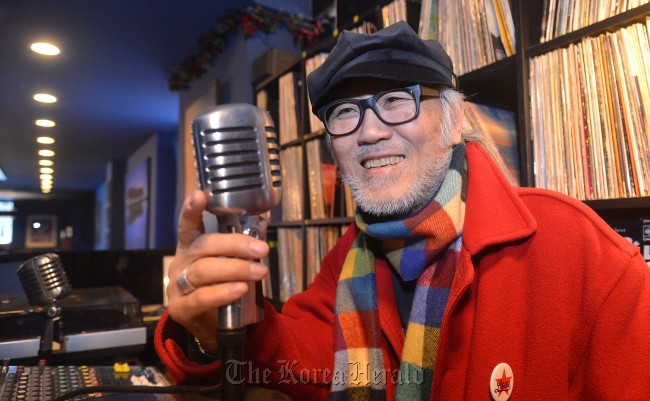The drum starts to beat, the guitarist makes out a tune and the singer scats. Each musician plays his or her own tune, without practice, without discussion. But they create a rich and exciting harmony. The audience stomps and claps, snapping their fingers with their eyes closed and crooning their own tunes.
When the music stops, the musicians, soaked in perspiration, smile with joy and the audience is briefly at a lose for words before they begin to applaud.
“Oh, that’s the beauty of jazz,” said jazz singer Kim Jun. “Jazz is liberal and very democratic. The music is filled with improvisation and ad libs ― the versatile use of rhythm and chords pound the heart every time.
“Every player gets to share the limelight ― during their solo part in the jam other instruments turn the volume down, without even discussing it beforehand. Others would add a hoot and let the ‘spiritual creativeness’ shine,” Kim said in an interview with The Korea Herald on Monday.
 |
Jazz singer Kim Jun poses at his caf in Namyangju, Gyeonggi Province, Monday. (Lee Sang-sub/The Korea Herald) |
It is true that jazz has never seen a heyday in Korea, but there are people craving for the dynamic yet soothing tunes.
And at a caf in Namyangju, Gyeonggi Province, the 72-year-old singer is waiting for the day when jazz becomes mainstream in the music industry, respected and cherished by a wide range of listeners. He has been releasing albums almost every year and runs his own club, The Kim Jun Jazz Club, performing live every weekend. He is also performing at a string of yearend and New Year’s concerts this winter.
“I try to make it as regular as possible because I want more people to feel comfortable about jazz and like it,” Kim said.
From houseboy to Johnny Boys
“The first time I came across jazz is when I worked as a houseboy at a U.S. military camp in Jeju during the Korean War,” he recalled. “I believe it was Louis Armstrong’s and the gospel-like atmosphere just captivated me. I had learnt English from the chaplain and I didn’t really feel that jazz and its lyrics were too foreign for me,” he added.
The little boy grew up and went to university to become a professional opera singer but found a new direction when he was hired by a state-run band.
Four of the members of the band, Yegrin, later decided to strike out independent and became a quartet, the Johnny Brothers. They became popular, releasing one hit record after another.
“Ppalgan Mahura (Red Scarf),” “Bangatganjip Duljjaeddal,” (The second daughter of the millers) “Obujaeui norae (The song of the Oh family)” and others shot the group to instant fame.
“Oh, boy, yes, we were popular. We were like the boy bands of our time,” he smiled. The band inspired by American groups such as Brothers4, Ames Brothers, Kingston Trio and others, were regarded as a breath of fresh air in the Korean music scene which was heavily dominated by trot music, more of a modernized version of Korean traditional tunes and rhythm.
“We would practice for more than eight hours a day. The amount of practice grounded my musical world,” he said.
Encounter with jazz
After Johnny Brothers disbanded in the late 1960s Kim performed at night clubs and small performance halls, singing and playing a wide range of music from classic, minyo (Korean traditional chants), canzone, Latin and others. And in the late 1980s he finally decided to settle on jazz.
“The Seoul Olympics in 1988 opened doors to international musicians to visit Korea. The so-called Western music’s thrush was a blessing for me. I started buying up albums ― I had about 3,000 and now own about 700. And I thought jazz would be the love of my life,” Kim said.
Kim said playing jazz is a life-long struggle.
“Jazz is not special, but it’s not easy,” he said. “I couldn’t fully adapt myself to it because it stemmed from Western culture and for an Asian like me, it hasn’t been easy to break its logic,” he said.
He delved into swing, big band music, classic artists like Miles Davis and Bill Evans. “I am still learning. I don’t think this will end,” he said.
Dreaming of ‘Korean jazz era’
Kim said he is upset that the current music industry does not appreciate jazz, though many genres have been influenced by it.
“People talk about K-pop all the time and so many singers appear on the scene. But when it comes to jazz, there are a handful of vocalists. When it comes to male singers, it is scarce. It is depressing,” he said.
Like his hero, American singer Tony Bennett who still holds more than 30 shows a year and has recently recorded an album with young musicians to honor his more than 60-year career, Kim is keen on nurturing the next generation of jazz musicians.
“Fortunately some of the young ones have studied abroad and can deliver the authentic jazzy mood. I am really looking forwarding to hearing them more,” he said.
Kim has released an album with Park Sun-ki, a vocalist he handpicked last year, and has recorded an album where young female jazz singer Woong San and others are featured.
“Lately I have become much inspired ― I am composing on a daily basis. I hope I will be able to record all those songs before I die,” he said.
By Bae Ji-sook (
baejisook@heraldcorp.com)








